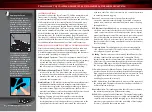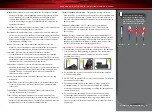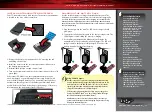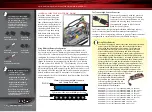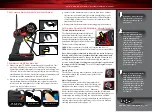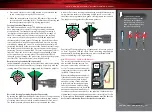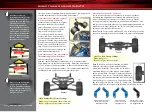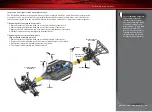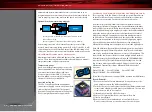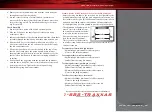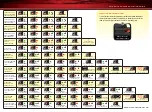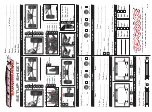
SLASH 4X4 ULTIMATE • 21
(L on the right side, R on the left side) to provide 1 degree of toe-in.
Slash 4x4 Ultimate also includes the plastic rear stub axle carriers as
used on the standard Slash 4X4 Ultimate, which offer 2.5 degrees of
toe-in. They can be installed on either side of the truck, they are not
left/right specific.
In general, increasing toe-in improves stability, while reducing toe-in
may help “loosen up” the truck’s handling to improve corner speed,
especially on high-grip tracks. Experiment to see what works best
for your track and driving style.
SHOCK MOUNTING POSITIONS
Big bumps and rough terrain
require a softer suspension
with the maximum possible
suspension travel and ride
height. Racing on a prepared
track or on-road use requires
a lower ride height and firmer,
more progressive suspension
settings. The more progressive
suspension settings help
reduce body roll (increased roll
stiffness), dive during braking,
and squat during acceleration.
The suspension of your model has been set up for off-road
performance (position 2 on the front suspension arms and position
3 on the rear suspension arms). If you plan on driving on hard
surfaces the following changes should be made:
1. Move the front shocks to position 3 on the suspension arms.
2. Move the rear shocks to position 4 or 5 on the suspension arms.
3. Add a 4mm preload spacer to the front shock.
4. Position 1 is not recommended for front or rear.
CENTERING YOUR SERVO
If you have removed the servo horn from your model’s steering servo,
or the servo has been removed for service or cleaning, the servo must
be re-centered prior to installation of the servo horn or installation of
the servo in the model.
1. Remove the servo horn from the steering servo.
2. Connect the steering servo to channel 1 on the receiver. Connect
the electronic speed control (ESC) to channel 2. The white wire on
the servo lead is positioned towards the receiver’s LED.
3. Turn the transmitter power switch on. Make certain the
transmitter’s batteries are no depleted.
4. Turn the transmitter’s steering trim knob to the center “0” position.
5. Disconnect motor wires “A” and “C” (see page 10) to prevent the
motor from turning during the next steps. Connect a fresh battery
pack to the speed control and turn on the ESC (see page 16). The
servo’s output shaft will automatically jump to its center position.
6. Install the servo horn onto the servo output shaft. The servo horn
should face toward the center of the chassis and be perpendicular
to the servo body.
7. Check servo operation by turning the steering wheel back and
forth to ensure that the mechanism has been centered properly
and you have equal throw in both directions. Use the transmitter’s
steering trim knob to fine-tune the position of the servo horn so
the model tracks straight when the steering wheel is at neutral.
ADJUSTING THE SLIPPER CLUTCH
The model is equipped with an
adjustable slipper clutch which is
built into the large spur gear. The
purpose of the slipper clutch is
to regulate the amount of power
sent to the wheels to prevent tire
spin. When it slips, the slipper
clutch makes a high-pitch, whining
noise. To adjust the slipper, use
the included wrench to hold the
adjusting nut and roll the model
forward to tighten and reverse to loosen.
Place the model on a high-traction surface, such as carpet . Adjust the
slipper so that you can hear it slip for approximately two feet from a
standing, full throttle start. (Learn more about adjusting the slipper
clutch in the sidebar.)
BASIC TUNING ADJUSTMENTS
To achieve a good starting
point for the slipper clutch
in this model, remove the
slipper gear assembly from
your model (
see page 23 for
instructions
) and tighten the
slipper clutch adjusting nut
clockwise until the slipper
clutch adjusting spring
fully collapses (do not over
tighten), and then turn the
slipper clutch nut counter-
clockwise one full turn.
Do not run your model with
the slipper clutch adjusting
spring fully compressed. The
minimum recommended
slipper clutch setting is 1/2
turn counter-clockwise from
fully compressed.
If you have questions or need technical assistance, call Traxxas at
1-888-TRAXXAS
(1-888-872-9927) (U.S. residents only)


